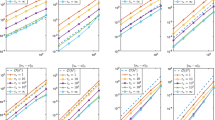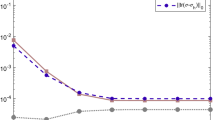Abstract
This work proposes a superconvergent hybridizable discontinuous Galerkin (HDG) method for the approximation of the Cauchy formulation of the Stokes equation using same degree of polynomials for the primal and mixed variables. The novel formulation relies on the well-known Voigt notation to strongly enforce the symmetry of the stress tensor. The proposed strategy introduces several advantages with respect to the existing HDG formulations. First, it remedies the suboptimal behavior experienced by the classical HDG method for formulations involving the symmetric part of the gradient of the primal variable. The optimal convergence of the mixed variable is retrieved and an element-by-element postprocess procedure leads to a superconvergent velocity field, even for low-order approximations. Second, no additional enrichment of the discrete spaces is required and a gain in computational efficiency follows from reducing the quantity of stored information and the size of the local problems. Eventually, the novel formulation naturally imposes physical tractions on the Neumann boundary. Numerical validation of the optimality of the method and its superconvergent properties is performed in 2D and 3D using meshes of different element types.










Similar content being viewed by others
References
Arnold, D., Falk, R., Winther, R.: Finite element exterior calculus, homological techniques, and applications. Acta Numer. 15, 1–155 (2006)
Batchelor, G.K.: An Introduction to Fluid Dynamics. Cambridge University Press, Cambridge (2000)
Boffi, D., Brezzi, F., Fortin, M.: Reduced symmetry elements in linear elasticity. Commun. Pure Appl. Anal. 8(1), 95–121 (2009)
Brezzi, F., Fortin, M.: Mixed and Hybrid Finite Elements Methods. Springer Series in Computational Mathematics. Springer, Berlin (1991)
Cangiani, A., Dong, Z., Georgoulis, E.H., Houston, P.: hp-Version Discontinuous Galerkin Methods on Polygonal and Polyhedral Meshes. Springer International Publishing, Cham (2017)
Carrero, J., Cockburn, B., Schötzau, D.: Hybridized globally divergence-free LDG methods. I. The Stokes problem. Math. Comp. 75(254), 533–563 (2006)
Cesmelioglu, A., Cockburn, B., Qiu, W.: Analysis of a hybridizable discontinuous Galerkin method for the steady-state incompressible Navier–Stokes equations. Math. Comp. 86(306), 1643–1670 (2017)
Ciarlet, P.G.: The Finite Element Method for Elliptic Problems, Classics in Applied Mathematics, vol. 40. Society for Industrial and Applied Mathematics (SIAM), Philadelphia (2002). Reprint of the 1978 original [North-Holland, Amsterdam]
Cockburn, B., Cui, J.: An analysis of HDG methods for the vorticity–velocity–pressure formulation of the Stokes problem in three dimensions. Math. Comp. 81(279), 1355–1368 (2012)
Cockburn, B., Dong, B., Guzmán, J.: A superconvergent LDG-hybridizable Galerkin method for second-order elliptic problems. Math. Comp. 77(264), 1887–1916 (2008)
Cockburn, B., Fu, G.: Superconvergence by \(M\)-decompositions. Part II: construction of two-dimensional finite elements. ESAIM Math. Model. Numer. Anal. 51(1), 165–186 (2017)
Cockburn, B., Fu, G.: Superconvergence by \(M\)-decompositions. Part III: construction of three-dimensional finite elements. ESAIM Math. Model. Numer. Anal. 51(1), 365–398 (2017)
Cockburn, B., Fu, G., Qiu, W.: A note on the devising of superconvergent HDG methods for Stokes flow by \(M\)-decompositions. IMA J. Numer. Anal. 37(2), 730–749 (2017)
Cockburn, B., Fu, G., Sayas, F.J.: Superconvergence by \(M\)-decompositions. Part I: general theory for HDG methods for diffusion. Math. Comp. 86(306), 1609–1641 (2017)
Cockburn, B., Gopalakrishnan, J.: Incompressible finite elements via hybridization. I. The Stokes system in two space dimensions. SIAM J. Numer. Anal. 43(4), 1627–1650 (2005)
Cockburn, B., Gopalakrishnan, J.: Incompressible finite elements via hybridization. II. The Stokes system in three space dimensions. SIAM J. Numer. Anal. 43(4), 1651–1672 (2005)
Cockburn, B., Gopalakrishnan, J.: The derivation of hybridizable discontinuous Galerkin methods for Stokes flow. SIAM J. Numer. Anal. 47(2), 1092–1125 (2009)
Cockburn, B., Gopalakrishnan, J., Lazarov, R.: Unified hybridization of discontinuous Galerkin, mixed, and continuous Galerkin methods for second order elliptic problems. SIAM J. Numer. Anal. 47(2), 1319–1365 (2009)
Cockburn, B., Gopalakrishnan, J., Nguyen, N.C., Peraire, J., Sayas, F.J.: Analysis of HDG methods for Stokes flow. Math. Comp. 80(274), 723–760 (2011)
Cockburn, B., Gopalakrishnan, J., Sayas, F.J.: A projection-based error analysis of HDG methods. Math. Comp. 79(271), 1351–1367 (2010)
Cockburn, B., Guzmán, J., Wang, H.: Superconvergent discontinuous Galerkin methods for second-order elliptic problems. Math. Comp. 78(265), 1–24 (2009)
Cockburn, B., Karniadakis, G.E., Shu, C.W. (eds.): Discontinuous Galerkin Methods. Springer, Berlin Heidelberg (2000)
Cockburn, B., Nguyen, N.C., Peraire, J.: A comparison of HDG methods for Stokes flow. J. Sci. Comput. 45(1–3), 215–237 (2010)
Cockburn, B., Shi, K.: Conditions for superconvergence of HDG methods for Stokes flow. Math. Comp. 82(282), 651–671 (2013)
Cockburn, B., Shi, K.: Devising HDG methods for Stokes flow: an overview. Comput. Fluids 98, 221–229 (2014)
Di Pietro, D., Ern, A.: Mathematical Aspects of Discontinuous Galerkin Methods. Mathématiques & Applications (Berlin) [Mathematics & Applications], vol. 69. Springer, Heidelberg (2012)
Di Pietro, D., Ern, A.: A hybrid high-order locking-free method for linear elasticity on general meshes. Comput. Methods Appl. Mech. Eng. 283, 1–21 (2015)
Donea, J., Huerta, A.: Finite Element Methods for Flow Problems. Wiley, New York (2003)
Ern, A., Guermond, J.L.: Theory and Practice of Finite Elements. Applied Mathematical Sciences, vol. 159. Springer, New York (2004)
Ethier, C.R., Steinman, D.A.: Exact fully 3d navierstokes solutions for benchmarking. Int. J. Numer. Methods Fluids 19(5), 369–375 (1994)
Feng, X., Karakashian, O., Xing, Y. (eds.): Recent developments in discontinuous Galerkin finite element methods for partial differential equations, The IMA Volumes in Mathematics and its Applications, vol. 157. Springer, Cham (2014). 2012 John H. Barrett Memorial Lectures, selected papers from the workshop held at the University of Tennessee, Knoxville, May 9–11, 2012
Fish, J., Belytschko, T.: A First Course in Finite Elements. Wiley, New York (2007)
Giorgiani, G., Fernández-Méndez, S., Huerta, A.: Hybridizable discontinuous Galerkin with degree adaptivity for the incompressible Navier–Stokes equations. Comput. Fluids 98, 196–208 (2014)
Hansbo, P., Larson, M.G.: Piecewise divergence-free discontinuous Galerkin methods for Stokes flow. Commun. Numer. Methods Eng. 24(5), 355–366 (2008)
Hesthaven, J.S., Warburton, T.: Nodal Discontinuous Galerkin Methods. Algorithms, Analysis, and Applications. Texts in Applied Mathematics, vol. 54. Springer, New York (2008)
Lehrenfeld, C., Schöberl, J.: High order exactly divergence-free hybrid discontinuous Galerkin methods for unsteady incompressible flows. Comput. Methods Appl. Mech. Eng. 307, 339–361 (2016)
Montlaur, A., Fernández-Méndez, S., Huerta, A.: Discontinuous Galerkin methods for the Stokes equations using divergence-free approximations. Int. J. Numer. Methods Fluids 57(9), 1071–1092 (2008)
Montlaur, A., Fernandez-Mendez, S., Peraire, J., Huerta, A.: Discontinuous Galerkin methods for the Navier–Stokes equations using solenoidal approximations. Int. J. Numer. Methods Fluids 64(5), 549–564 (2010)
Nguyen, N., Peraire, J., Cockburn, B.: A hybridizable discontinuous Galerkin method for Stokes flow. Comput. Methods Appl. Mech. Eng. 199(9–12), 582–597 (2010)
Nguyen, N.C., Peraire, J., Cockburn, B.: An implicit high-order hybridizable discontinuous Galerkin method for linear convection–diffusion equations. J. Comput. Phys. 228(9), 3232–3254 (2009)
Nguyen, N.C., Peraire, J., Cockburn, B.: An implicit high-order hybridizable discontinuous Galerkin method for nonlinear convection-diffusion equations. J. Comput. Phys. 228(23), 8841–8855 (2009)
Nguyen, N.C., Peraire, J., Cockburn, B.: An implicit high-order hybridizable discontinuous Galerkin method for the incompressible Navier–Stokes equations. J. Comput. Phys. 230(4), 1147–1170 (2011)
Oikawa, I.: Analysis of a reduced-order HDG method for the Stokes equations. J. Sci. Comput. 67(2), 475–492 (2016)
Peraire, J., Persson, P.O.: The compact discontinuous Galerkin (CDG) method for elliptic problems. SIAM J. Sci. Comput. 30(4), 1806–1824 (2008)
Poya, R., Sevilla, R., Gil, A.J.: A unified approach for a posteriori high-order curved mesh generation using solid mechanics. Comput. Mech. 58(3), 457–490 (2016)
Qiu, W., Shi, K.: A superconvergent HDG method for the incompressible Navier–Stokes equations on general polyhedral meshes. IMA J. Numer. Anal. 36(4), 1943–1967 (2016)
Rivière, B.: Discontinuous Galerkin Methods for Solving Elliptic and Parabolic Equations. Society for Industrial and Applied Mathematics, Philadelphia (2008)
Sevilla, R., Giacomini, M., Karkoulias, A., Huerta, A.: A superconvergent hybridisable discontinuous Galerkin method for linear elasticity. Int. J. Numer. Methods Eng. 116(2), 91–116 (2018)
Sevilla, R., Hassan, O., Morgan, K.: An analysis of the performance of a high-order stabilised finite element method for simulating compressible flows. Comput. Methods Appl. Mech. Eng. 253, 15–27 (2013)
Sevilla, R., Huerta, A.: Tutorial on hybridizable discontinuous Galerkin (HDG) for second-order elliptic problems. In: Schröder, J., Wriggers, P. (eds.) Advanced Finite Element Technologies. CISM International Centre for Mechanical Sciences, vol. 566, pp. 105–129. Springer International Publishing, Cham (2016)
Sevilla, R., Huerta, A.: HDG-NEFEM with degree adaptivity for Stokes flows. J. Sci. Comput. (2018). https://doi.org/10.1007/s10915-018-0657-2
Stenberg, R.: Some new families of finite elements for the Stokes equations. Numer. Math. 56(8), 827–838 (1990)
Xie, Z.Q., Sevilla, R., Hassan, O., Morgan, K.: The generation of arbitrary order curved meshes for 3D finite element analysis. Comput. Mech. 51, 361–374 (2013)
Zhai, Q., Zhang, R., Wang, X.: A hybridized weak galerkin finite element scheme for the Stokes equations. Sci. China Math. 58(11), 2455–2472 (2015)
Author information
Authors and Affiliations
Corresponding author
Additional information
This work was partially supported by the European Union’s Horizon 2020 research and innovation programme under the Marie Skłodowska-Curie Grant Agreement No. 675919 and the Spanish Ministry of Economy and Competitiveness (Grant number: DPI2017-85139-C2-2-R). The support of the Generalitat de Catalunya (Grant number: 2017SGR1278) is also gratefully acknowledged. Finally, Alexandros Karkoulias was supported by the European Education, Audiovisual and Culture Executive Agency (EACEA) under the Erasmus Mundus Joint Doctorate Simulation in Engineering and Entrepreneurship Development (SEED), FPA 2013-0043.
Rights and permissions
About this article
Cite this article
Giacomini, M., Karkoulias, A., Sevilla, R. et al. A Superconvergent HDG Method for Stokes Flow with Strongly Enforced Symmetry of the Stress Tensor. J Sci Comput 77, 1679–1702 (2018). https://doi.org/10.1007/s10915-018-0855-y
Received:
Revised:
Accepted:
Published:
Issue Date:
DOI: https://doi.org/10.1007/s10915-018-0855-y
Keywords
- Hybridizable discontinuous Galerkin
- Stokes flow
- Cauchy stress formulation
- Voigt notation
- Superconvergence




